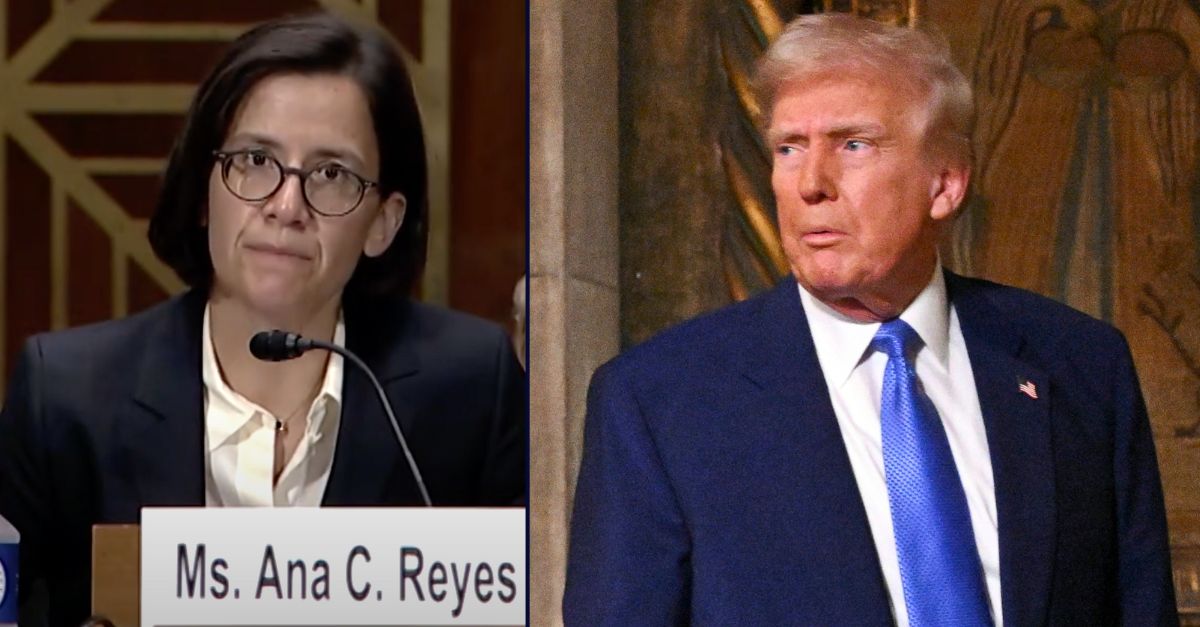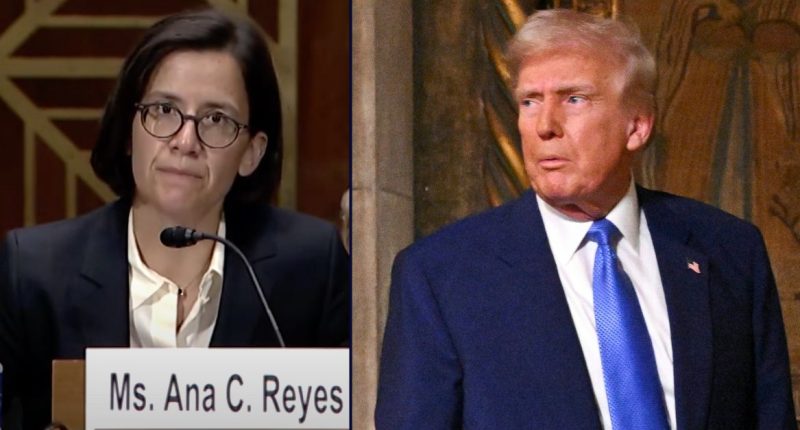
Left: U.S. District Judge Ana C. Reyes during her confirmation hearings in June 2022 (U.S. Senate/YouTube). Right: President Donald Trump departs after speaking at Mar-a-Lago in Palm Beach, Fla., Tuesday, Feb. 18, 2025 (Pool via AP).
A lawyer representing the Trump administration was repeatedly dressed down by a federal judge on Wednesday during a preliminary injunction hearing over the Pentagon’s transgender ban.
During the hearing, U.S. District Judge Ana C. Reyes, a Joe Biden appointee, mercilessly lambasted the government’s lawyers for what she saw as problems with their basic competence, middling legal analysis, lack of preparation, intellectual honesty, and more.
On Jan. 28, Nicolas Talbott and seven others filed their complaint with the U.S. District Court for the District of Columbia. The lawsuit alleges the ban on transgender service members violates the Due Process clause of the Fifth Amendment by discriminating against people “based on their sex and based on their transgender status.”
The complaint has since been amended multiple times to include additional transgender members of the armed forces. Now, the parties are trying to convince the judge whether or not to enjoin the ban before it goes into effect later this month as currently scheduled.
As the hearing opened, the court focused on prior versions of transgender military bans instituted by President Donald Trump during his first term in office. This prelude led to a back-and-forth parsing about variations in language used in government motions to support the ban and the Pentagon directives which formalize the ban.
Reyes all but immediately chided the government for leaving out “the most critical clause of the policy” in one such court filing. This clause, the court observed, purports to kick out all service members who “exhibit symptoms of gender dysphoria.”
“This seems like it opens up the entire scope to basically anything,” the judge said, arguing that depression is a symptom of gender dysphoria. She added that if the military kicks out anyone with depression, then the armed forces are likely to be poorly-staffed.
The judge went on to scold the government lawyers for their apparent imprecision and suggested better attention to detail when asking for the judiciary to “sign off” on a broad policy change.
“We’re not asking you to sign off on anything,” the Department of Justice attorney said. But the judge brushed off the technically correct response as unavailing in the context of an adversarial proceeding.
More Law&Crime coverage: ‘The total amount’: Judge who ridiculed DOJ lawyer over transgender military ban demands transparency from Pentagon about wide range of budget information
Discussion quickly turned to a Department of Defense post on X (formerly Twitter) reposted by Secretary of Defense Pete Hegseth. The post read: “Transgender troops are disqualified from service without an exemption.”
By pointing this out, the judge again took issue with discrepancies between text in the government’s court filings and elsewhere.
“To the extent that trans-identifying persons would prefer to serve in the sex with which they identify even if they do not have gender dysphoria, that does not suggest that there is a categorical ban,” the defense motion in opposition reads. “In fact, such service members can continue serving under the standards of their biological sex.”
The DOJ’s lawyer resisted the implication that Hegseth’s repost was in any way determinative of the government’s actual policy.
Reyes did not credit this approach.
“Why shouldn’t I look at the words of the guy who issued the policy?” the judge asked at one point.
The government’s attorney replied that people use colloquial terms to mean more specific things all the time.
The judge strongly rejected this argument.
“Is that really how you think this all works?” Reyes asked. She went on to explain that the X accounts in question collectively have “millions of followers” and are funded by the U.S. public. “We’re not talking about people, we’re talking about the secretary of defense.”
The lawyer went on to essay the notion that Hegseth was possibly using “shorthand” to refer to the overall policy.
Again, the judge rejected the notion.
“Do you believe the secretary of defense was using loose language he didn’t comprehend or that he didn’t think out?”
The attorney quickly replied: “I’m not arguing that.”
The DOJ lawyer went on to insist the court should look to the words of the policy itself rather than Hegseth’s social media post. The court, however, remained unconvinced.
“The record is that his word is: this covers all transgender people,” Reyes told the government lawyer.
The judge ended the social media post discussion by giving the government until March 17 to obtain a declaration from Hegseth that his X post did not accurately reflect the position of the Department of Defense. Otherwise, the court would take the X post into account when ruling on the preliminary injunction, Reyes said.
More Law&Crime coverage: ‘You do have an answer, you just don’t want to give it’: Judge ridicules DOJ lawyer during transgender military ban hearing
The landscape did not get any easier for the government to clear when the judge moved on to another defense argument.
To hear the plaintiffs tell it in their memorandum in support of a preliminary injunction, the anti-transgender policy is motivated by “unconstitutional animus.”
The government flatly rejects this argument in its own motion, which reads: “Plaintiffs’ allegations of animus are unfounded.”
To this end, the DOJ believes the 2018 U.S. Supreme Court case of Trump v. Hawaii is controlling. In that case, the nation’s highest court discounted concerns about anti-Muslim or anti-Islam bias when upholding the constitutionality of the first Trump administration’s travel ban — which almost entirely targeted Muslim-majority countries. Of little importance was, when campaigning, Trump called the policy a “Muslim ban.” In the end, the majority looked to, and credited, the text of the policy itself instead of Trump’s verbiage.
On Wednesday, Reyes refused to countenance the comparison.
“Explain to me how Trump v. Hawaii helps you,” the judge skeptically said at the outset — before launching into a lengthy lecture about how the cases were fundamentally different.
In the court’s view, the travel ban had undergone far too many different changes — over more than a year — after initially being enjoined to be distinguishable from the original “Muslim ban.”
This was how Chief Justice John Roberts ultimately allowed the travel ban to withstand constitutional scrutiny, Reyes said. Such a situation was not comparable to the transgender military ban situation where the administration is currently still tweeting out verbiage about categorical bans on transgender people, the judge said.
“What we’re not going to do is confuse this record,” Reyes intoned. “We don’t have the same situation here that we do in Trump v. Hawaii.”
When the DOJ lawyer attempted to push back about being able to argue the point, the judge was not having it.
“You could argue I’m 10 feet tall,” she said.
The morning session petered out in dramatic fashion as the court attempted to move on to a series of scientific combat readiness studies cited by the Pentagon in issuing the anti-transgender policy.
Reyes, leaving nothing to the imagination, said the Pentagon’s directive and subsequent guidance “grossly misquote” and “egregiously misquote” the studies in question. Then, as she clearly aimed to hem the government’s lawyer in on how the studies were interpreted, expressed genuine shock, outrage, and incredulity.
The DOJ lawyer, it turned out, admittedly had not read most of those studies. Then, when the judge asked another member of the government’s legal team if anyone else in attendance was better briefed on — and therefore better situated to deal with — the issue, she received an answer in the negative.
The lack of preparation was remarked upon.
“Do you think it’s important to understand … what those reports actually say?” the judge asked the lead litigator pointedly.
After upbraiding two lawyers for not reading the studies at length, the judge mused about her past statements and work on the case.
First of all, she said, she told the parties on Feb. 19 that the studies were important to the case and that they should be briefed on them.
“I even had a discussion with my clerk,” Reyes went on — saying she considered issuing a minute order mandating a literature review on the parties. “But I was like: ‘No, they will have read the reports.””
The court then took a 30-minute late-morning break for the government and the judge to review the studies in question “carefully.”
As expected, when the hearing resumed, Reyes disdained the government’s interpretations of the studies on point after point.
Summarizing her position, the judge said the Pentagon “cherry-picked” the data it wanted to use and “misrepresented even that” in order to give the false appearance that transgender service members were less well-suited to deployment than cisgender service members. Rather, the judge said, the data showed something more like the opposite.
The government’s lawyer occasionally conceded that some data points could be interpreted different from how the Trump administration interpreted them — but largely hewed to noncommittal answers and said he would defer to current military experts.
The hearing, still focused on the defense and with no end in sight, was slated to pick up again after lunch with “constitutional arguments” for why the government believes the ban should be enforced.
After the hearing resumed, the court, with volume down, moved to soften some of the ample blows by explaining that she was asking the defense so many questions because the plaintiffs are asking her to enjoin the president of the United States. Reyes said she wanted to make sure she had everything important and relevant on the record before considering such “extraordinary” relief.




